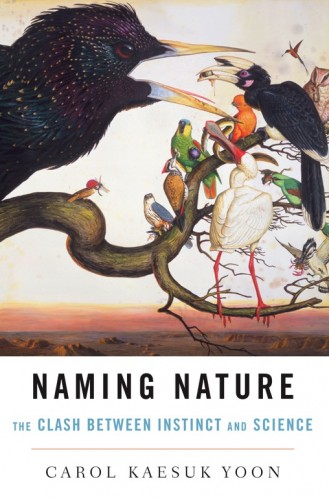Natural-born talent is something of a rare occurrence, with athletes like Mantle or Gretzky, or composers like Beethoven or Bach only coming along once or twice a generation. But does natural-born talent apply to a field like taxonomy? Are some people more adept at recognizing the differences and similarities between species, perhaps better connected to the “natural order”? In her book, “Naming Nature; the clash between instinct and science”, Carol Kaesuk Yoon examines not only this idea but also provides an historical account of how taxonomy has been done, from early hunter-gatherers to today.
With her experience as a science columnist for the New York Times, her background as an ecologist and evolutionary biologist, and a clear passion for the natural world, Carol Kaesuk Yoon provides an excellent intoduction to the field of taxonomy and some intriguing stories about those that have been involved with its maturation. In a style very similar to David Quammen (The Song of the Dodo – one of my favourite science books), Yoon brings the reader along on her quest to discover why humans are compelled to discover and order life, and how taxonomy as a science has grown over the past 250 years. With excellent personal biographies of some of the major players in the history of taxonomy such as Linneaus, Mayer and Hennig amoungst others, Yoon not only explains why these scientists were so important to taxonomy and how they revolutionized the science, but also provide an intimate portrait of how the experiences in each of their lives helped shape their ideas of the natural order. Getting to know the legends of my field of study was quite enlightening for me, and probably my favourite aspect of the book!
Science isn’t everything though (I know, hard to believe) and Yoon goes above and beyond and explores how our drive to categorize nature may have evolved, the portions of the brain that may be responsible, and how cultures around the world name the species around them in similar ways. Pretty amazing stuff when you think about it, especially the argument that certain words, even in languages that you’ve never heard of, are better suited for different taxa, and even though you’re thousands of miles away from where these obscure languages are spoken you can still choose which words mean “fish” and which words mean “bird”. It’s this shared “umwelt”, a key concept that Yoon ties all of this story together with, that at times amazed me, and at times bored me. There were times when it seemed that Yoon thought of this “umwelt” as a cross between a shared global consciousness and “The Force” of Star Wars fame, a power that could make or break a taxonomist depending on how attuned they were to it (“use the Umwelt Willi”). Although I find it remarkable that I could possibly understand that the mystery animal a New Guinean tribesman is describing to me is a fish and not a bird, I can’t believe that taxonomists are the Jedi’s of nomenclature and that “fate” played a bigger role in our science than logic. Of course, Yoon eventually points out that cladistics and “raving Cladists” effectively killed the human umwelt with their logic, so perhaps things aren’t so bad after all (but does that make cladistics the “Dark Side” and Hennig the Emperor? I suppose it appeared that way in the 1970’s & 1980’s…).
The only other aspect of Naming Nature that I had an issue with was the way that molecular characters were made to sound as the way of the future and that morphological taxonomy and characters were antiquated and ready to go the way of the dinosaur. But as any good cladist knows, birds are merely highly modified dinosaurs, so perhaps there’s still hope for morphology after all ;)!
Overall this book was an excellent read and one that I think anyone with an interest in knowing where species names come from, either casually or professionally, would find worthwhile. The science is accessibly explained through examples, the biographies are great, and the topic is well deserving of such a first class treatment! I’d highly recommend this for a summer read!
Oh, and may the umwelt be with you!


Sounds like a good read for us pedants – I’ll have to check it out.
I’ve always liked Yoon’s work – well researched, not sensationalized, and factually accurate to a degree far beyond the usual newspaper article. Both my wife and I have had our research written up by Yoon and neither of us had any complaints, so this respect comes with knowledge. One wonders how she deflects the errors and hype that editors seem so determined to insert?
As for umwelt, well, people do seem to have a need to put names on things. I think it makes us feel more in control, especially when we know the secret scientific name, then we can make Nature do our will. I’m sure Glenn Hunt was thinking along these lines when he named Darthvaderum greensladeae Hunt, 1996.